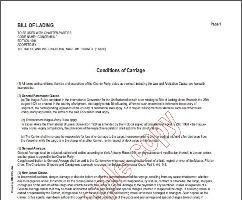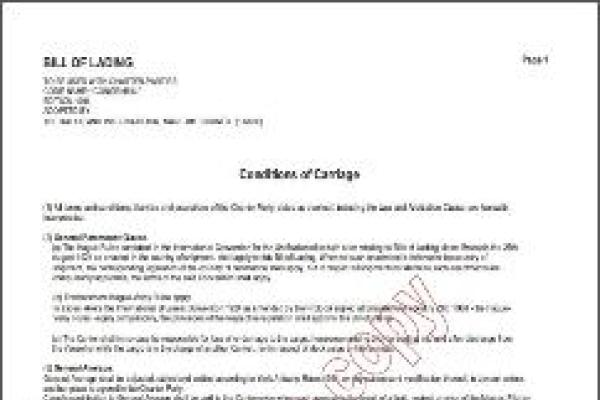
Steamship Mutual
Published: November 01, 2013

The English High Court has recently held that where a bill of lading incorporated the "law and arbitration clause" of an identified charterparty but the dispute resolution clause in that charterparty provided not for English law and arbitration, but for English law and court jurisdiction, the words "law and arbitration" were effective to incorporate the English law and court jurisdiction clause.
The facts
In Caresse Navigation Ltd. v Office National de l'Electricité & Ors [2013] EWHC 3081 (The Channel Ranger), a cargo of coal carried from the Netherlands to Morocco on the "MV Channel Ranger" was alleged to be damaged on outturn in Morocco. Cargo receivers and their insurers sought to hold vessel owners responsible for the damage.
The bill of lading under which the cargo was carried was on the CONGEN 1994 form. On the reverse, clause 1 of the conditions of carriage provided that "all terms and conditions, liberties and exceptions of the Charter Party, dated as overleaf, including the Law and Arbitration Clause, are herewith incorporated". A similar provision was typed on the front of the bill of lading.
The charterparty incorporated by reference was a voyage charter on the Americanised Welsh Coal Charter ("Amwelsh") form 1979, clause 5 of which provided:
"This Charter Party shall be governed by English law, and any dispute arising out of or in connection with this Charter shall be submitted to the exclusive jurisdiction of the High Court of Justice of England and Wales."
There was no other clause in the incorporated charterparty dealing with applicable law or with dispute resolution.
Owners commenced proceedings in England in June 2011 for a declaration that they are not liable for any damage to the cargo. In March 2013, cargo insurers commenced proceedings in Morocco against owners and stevedores, and issued an application in England challenging the jurisdiction of the English High Court. They argued that the reference in the bill of lading to the "law and arbitration clause" in the charterparty did not incorporate the law and English High Court jurisdiction clause from that charterparty into the bill of lading.
The Arguments
Owners relied on two separate jurisdictional gateways as the basis on which the English Court should accept jurisdiction. First, that the bill of lading was a contract "governed by English law" and second, that the bill "contains a term to the effect that the court shall have jurisdiction to determine any claim in respect of the contract".
In relation to the choice of English law, the Court held that general words of incorporation were sufficient to incorporate a clause providing for English law. Furthermore, in this case, whatever the effect of the words "and arbitration" in the bill of lading, the Court held that the express references to the governing law of the charterparty amounted to an irrefutable case that the parties to the bill of lading intended it to be governed by the same law that governed the charterparty, at any rate so long as the chosen law was usual and proper for the trade.
As for the words "... and arbitration clause", owners argued that the specific incorporating words of the bill of lading demonstrated an intention to incorporate the charterparty dispute resolution clause, and could only refer to clause 5 of the charterparty which provided for court jurisdiction. Where a bill contains specific words of incorporation, owners contended, there is no need to interpret those words strictly. Here, it was clear that the parties had made a mistake by referring to "arbitration" when they meant "jurisdiction", and the bill of lading should be construed so as to give effect to the parties' intentions (Chartbrook Ltd v Persimmon Homes Ltd [2009] UKHL 38).
For their part, cargo interests submitted that the longstanding rules about incorporation of charterparty terms into bills of lading establish the need for clarity and certainty, particularly considering that bills of lading may come into the hands of other parties (such as consignees) who are unaware of the terms of the relevant charterparty. There was no reason to suppose that the original parties to the bill of lading made a mistake in referring to arbitration. Instead, cargo interests argued, effect could be given to the words of incorporation by construing them to mean that the charterparty arbitration clause "if any" was incorporated into the bill.
The Judgment
The Court held that the charterparty law and English High Court jurisdiction clause was incorporated into the bill of lading. In giving his judgment, Mr. Justice Males agreed with owners that the question was one of construction rather than incorporation, and that the Court had to consider what the parties meant by the words "law and arbitration clause" in the bill of lading. In the Court's view, the only clause in the charterparty to which the parties could have intended to refer to was clause 5, the law and jurisdiction clause.
Mr. Justice Males stressed that none of this offended against the need for clarity and certainty. The consignee would know from the specific words of incorporation that the charterparty terms incorporated were not confined to those germane to the shipment, carriage and delivery of the goods, but extended to ancillary clauses including those concerned with choice of law and dispute resolution. Before commencing any proceedings, the consignee would need to see the charterparty to know where the arbitration was to be held, whether the tribunal was to be a sole arbitrator or three arbitrators, and so on. For all of these reasons, the Court concluded that consignees are equally bound by a clause in a charterparty which the original parties to the bill of lading clearly had in mind when referring to the charterparty "arbitration" clause, provided that the clause in question is usual in the trade.
Comment
The Court has confirmed that where specific words of incorporation are used to incorporate a law and dispute resolution clause and a mistake has clearly been made in the words of incorporation used, the mistake can be corrected so as to give effect to the parties' intentions. In this case, the result was that the law and jurisdiction clause in the charterparty was incorporated in the bill of lading even though the words of incorporation referred to the charterparty "law and arbitration clause". The decision is subject to appeal.
We are grateful to David Morriss and Jenny Salmon of Holman Fenwick Willan LLP, who acted for vessel owner, Caresse Navigation Ltd., for this article.


